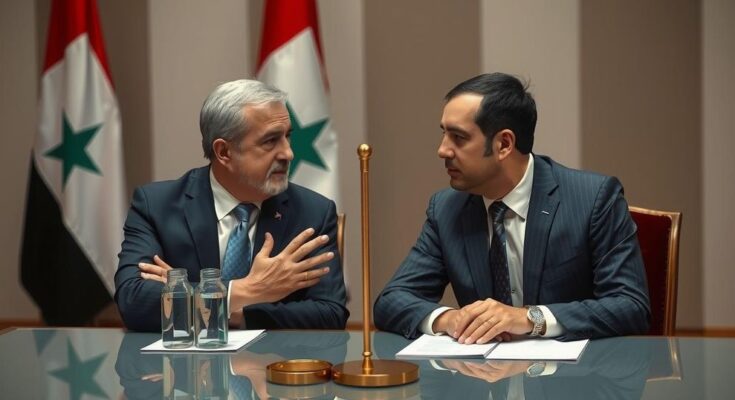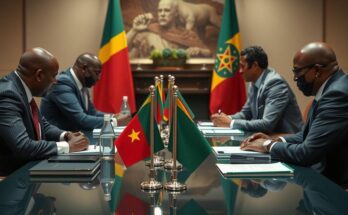Jordanian Foreign Minister Ayman Safadi met with Syrian leader Ahmed al-Sharaa following the Assad regime’s collapse, signaling a critical shift in Jordan-Syria relations. This meeting emphasizes Jordan’s intent to secure its borders and support Syrian stability while addressing its refugee crisis. The U.S. continues to play a significant role in regional security through its military presence, impacting Jordan’s strategic interests.
On December 23, 2023, Jordanian Foreign Minister Ayman Safadi engaged in discussions with Syrian leader Ahmed al-Sharaa, following the takeover of Damascus by Hayat Tahrir al-Sham on December 8. This meeting is significant given Jordan’s geographical proximity and intricate historical ties with Syria. Foreign Minister Safadi’s visit aligns with the outreach efforts by various nations, including Turkey and the Gulf states, to understand the repercussions of the Assad regime’s downfall and the emerging political landscape in Syria.
The Jordanian government emphasized its commitment to supporting Syrian security and stability. Minister of State for Government Communication, Mohammad al-Momani, articulated that Jordan’s stance reflects its deep-rooted relations with Syria, aiming to foster security, territorial unity, and the robustness of Syrian institutions. Given the historical context of the Syrian civil war that has seen a significant influx of refugees into Jordan, it is vital for the kingdom to stabilize its northern border and address the safety concerns stemming from this prolonged conflict.
Since the onset of the civil war in 2011, Jordan faced challenges not only from the humanitarian crisis but also from terrorism threats, particularly from ISIS. In response, Jordan partnered with international forces to support Syrian rebel factions, although such efforts were curtailed following the Russian-backed regime’s resurgence in southern Syria in 2018. With the new dynamics resulting from the regime’s collapse, Jordan now finds opportunities to regain influence in important southern territories such as Dara’a.
The United States continues to play a critical role through its military presence in Tanf, near Jordan’s border. Here, American troops are training Syrian rebels to maintain regional stability. While this base might seem remote, the implications of its operations are vital for Jordan, particularly in light of threats posed by Iranian-backed militias targeting areas near the border.
As of recent reports, Jordan is navigating complex diplomatic channels while still hosting nearly 680,000 Syrian refugees. The Jordanian government noted that some refugees have begun returning home, signifying potential shifts within the region. The geopolitical atmosphere remains charged, with Jordan engaging in discussions with eight Arab nations and other global powers to seek solutions regarding the ongoing challenges within Syria. The historical context of Jordan-Syria relations further complicates this, underscored by a shared past that continues to influence present dynamics.
This article explores the evolving diplomatic relationship between Jordan and Syria following the recent fall of the Assad regime. As a neighboring country, Jordan has maintained a complex historical interaction with Syria, which includes collaboration during crises and refugee management. The narrative underscores how Jordan’s security concerns, stemming from geopolitical instabilities and the Syrian civil war, have informed its current foreign policy direction. Moreover, it highlights the implications of international military presence and support in the region, particularly from the United States, in stabilizing the situation post-Assad.
In conclusion, Jordan’s outreach to the new Syrian government marks a significant turning point in regional dynamics following the Assad regime’s collapse. This engagement reflects Jordan’s commitment to fostering security and stability along its northern border while accommodating the ongoing refugee situation. As Jordan navigates these complexities, the involvement of international actors, particularly the United States, remains crucial in fostering a stable future for both Jordan and Syria amid evolving geopolitical realities.
Original Source: www.jpost.com




